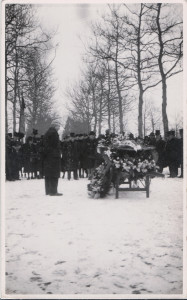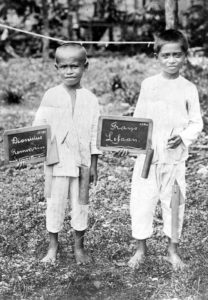Today I graduate with a Master of Letters in Family and Local History from the University of Dundee. My grades allowed me to graduate with Distinction, the highest award that the university bestows. I started my studies during lockdown in 2020. I am not one to grow indoor tomatoes or bake sourdough bread, so I went and did a master's instead. This degree was completely via remote study, which made it a perfect choice for me. The Netherlands does not offer academic programs in genealogy, so … [Read more...]
Map of the week – Maastricht, 1585
In 1585, Braun and Hogenberg published an atlas with maps of different cities in Europe, including many in the Netherlands. This map shows Maastricht. What is nice about these maps is that it shows the people in their local costumes. It shows all the houses in the city, and you can see the different expensions. The detail shows the main church in Maastricht, the St. Servaas. The blue color of the roof indicates it is an untaxed building, usually either religious or city buildings. You can see … [Read more...]
Dutch Genealogy News for June 2024
Here is an overview of the new sources, projects, and websites that were announced last month. Sources Death records of Suriname (1846-1915) have been digitized and indexed and are available on the website of the National Archives of Suriname. The Ward Registers of Paramaribo, Suriname 1828-1847 have been digitized and indexed and are available on the website of the National Archives of Suriname. The ward registers are annual recordings of all the free people living at each address. … [Read more...]
Map of the Week – Goes, 1867
Between 1865-1868, Jacob Kuyper published a series of atlases with municipal maps. These show the location of all the hamlets, villages, and larger towns in the municipality, as well as the main roads and railroads. The Kuyper maps are often available at the websites of archives or via Wikimedia Commons. This week we are looking at Kuyper's map of Goes, in the province of Zeeland in 1867. It shows that Goes had a railroad connection to Bergen op Zoom and a railway station just south of the … [Read more...]
Dutch term – Lijkschouwing
Lijkschouwing literally means corpse-assessment. It is the term for the assesment by a doctor after a person died, to determine whether the person died of natural known causes, natural unknown causes, or unnatural causes. This is typically done by the doctor treating the patient or the doctor who was on call when the patient died. If unnatural causes are suspected, the doctor will inform the municipal coroner and an autopsy is usually performed. This is how it is under the current law (1991). … [Read more...]
Map of the Week – Tourist map of Oisterwijk, 1933
This week we are looking at a tourist map of Oisterwijk from 1933. It is a "wandelkaart" [walking map], which highlights various natural features like lakes (blue), forests (green), national forests (orange), swamps (blue horizontal stripes). It features the hotels in the area and places of interest including churches, a swimming pool, and cafes. The early 1900s saw the rise of tourism for the middle and upper classes. Railroads allowed people to travel across the country affordably and … [Read more...]
Quick tip – Identity is more than a name
Identity is more than a name. Just because two records show the same name, does not mean they are for the same person. The reverse is true too. Just because two records show a different name, does not mean they are for different persons. People could use different names throughout their lifetime. Some examples: Some people used patronymics and later adopted a surname. They might be listed under their patronymic in one record, and under their surname in another. Some people … [Read more...]
Map of the Week – Border between Gelderland and Munster near Winterswijk, 1656
This week's map was created in 1656 as part of a conference to settle a boundary dispute between Gelderland and Munster. Around Winterswijk, the border area was covered in moors, and it was unclear where Gelderland ended and Munster started. Farmers from both sides were continuously arguing over who had rights to graze sheep there or collect sods and firewood from those common areas. Nicolaas van Geelkercken was tasked with creating maps showing the border according to Gelderland sources. One … [Read more...]
New Netherland Settlers Project
The New York Genealogical and Biographical Society just announced an exciting new project. They launched a multiyear project to develop detailed, peer-reviewed sketches of all the people residing in New Netherland prior to 1664. I am proud to announce that I will be one of the researchers on the project. I will prepare sketches, review and select source material, and advise the project about the information architecture and direction, and scope. I will be working on the project … [Read more...]
Map of the Week – Schermer land reclamation, 1635
This map shows the Scher-meer [Scher lake, also called Schermermeer], a lake that was drained between 1633 and 1635 to claim land. The map shows how this was done: a dike and ditch were built around the lake. Mills would pump water out of the lake, across the dike, into the surrounding ditch, from where it was carried to rivers and ultimately to the sea. Smaller ditches would criss-cross the lake to drain the land. The mills had to continously pump or the lake would fill up again. The Dutch … [Read more...]










